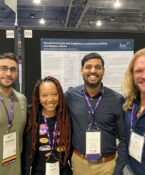HSC researchers receive NIH grant to study the risks young adults associate with alcohol and marijuana use
A new study led by researchers at The University of North Texas Health Science Center at Fort Worth (HSC) focuses on uncovering young adults’ perceptions toward alcohol and marijuana use and their personal safety.
The study looks at young adults’ protective strategies when using one or both substances together to reduce harm or negative consequences.
This three-year study, funded by the National Institutes of Health (NIH)/National Institute on Alcohol Abuse and Alcoholism (NIAAA), is being led by HSC School of Public Health (SPH) Professor Melissa A. Lewis, PhD, Principal Investigator (PI), and SPH Associate Professor Dana M. Litt, PhD, Co-Investigator. They are joined in the project by researchers from the University of Washington.
“Young adult alcohol and marijuana use is a significant public health concern, and the risks increase when both substances are used together,” Dr. Lewis said. “Recent national estimates show that 62.6% of young adults have been drunk in the past year, and marijuana use among this population has grown in the last decade.”
Lewis said marijuana is viewed by many as more acceptable and healthier, perhaps because it’s an herb or is used medically under certain conditions.
Young adulthood is associated with higher alcohol use than other developmental periods, the researchers report, with an estimated 29.2% of 18- to 29-year-old previous-year drinkers having an alcohol use disorder.
For marijuana, the lifetime rates of use among U.S. young adults are 60%, with 24% reporting they have used marijuana in the last 30 days and 8% reporting daily use.
“The majority of people who use alcohol and marijuana use both together,” Dr. Litt said. “Almost one quarter of adolescents and young adults report simultaneous alcohol and marijuana use when asked about the past year or the last party they attended.”
“Simultaneous alcohol and marijuana use, where the effects of both substances overlap, increases the risk for acute and long-term consequences, such as academic/occupational impairment, decreased cognitive functioning, blackouts, sexual or personal victimization, injury, even death,” Dr. Litt said.
The strategies that young adults use or don’t use for reducing alcohol risk – like planning a designated driver, watching their drinks when at a bar, drinking slowly rather than chugging – can vary from person to person and according to different circumstances. Marijuana users have their own strategies, such as waiting to smoke at the end of a day versus when they must work or attend class.
“Little is known about why young adults choose to use certain protective behavioral strategies on specific occasions or why they might use them differently at different times,” Dr. Lewis said.
“This is an important goal of our research – to determine the motivations, or reasons for when, why and how young adults may or may not use alcohol and/or marijuana protective behavioral strategies in a consistent, quality manner.”
“Better understanding their motivations and use of protective behavioral strategies is an important step for influencing positive changes in young adults’ future behaviors,” Dr. Lewis added.
Interviews, focus groups, and online surveys conducted in the project’s first phase will serve as the foundation for developing and testing a toolkit of novel online and text message strategies to be used in the pilot study. That study, to take place in Phase 2, can be used by young adults to limit intake and reduce the risk from both substances, either separately or if combined.
About 200 participants between ages 18-24 will be involved in the pilot study, which will also look at gender differences to see how protective strategies may vary and tailor the personalized risk-protection messaging accordingly.
“The most successful young adult alcohol or marijuana interventions involve accurate, nonjudgmental, personalized feedback,” Dr. Litt said. “Many such interventions aim to identify a ‘hook,’ or personally-relevant reason to make a change by employing clinical Motivational Interviewing techniques.”
Litt added: “Our outcomes will follow that model – although the decision to change is left with the individual, young adults will be provided with protective behavioral strategies, so they have tools to help them reduce their drinking or marijuana behavior if they decide to do so.”
The results of this work are expected to make new inroads into an age-old public health concern of reducing the dangers for young adults and impacting their future by encouraging safer behaviors.
“In this study, we will attempt to dig deeper into the most meaningful motivators and solutions, so we can make a real difference in moving current and future generations of young adults toward positive change and less risky use of both alcohol and marijuana,” Dr. Lewis said.






Social media